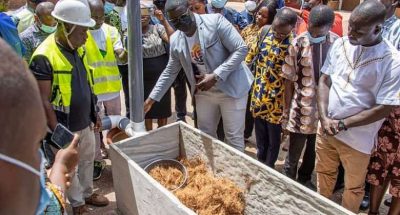The Ministry for Sanitation and Water Resources (MSWR) on Thursday, March 31, 2022, organised a programme in Accra to introduce the bio-digester c
The Ministry for Sanitation and Water Resources (MSWR) on Thursday, March 31, 2022, organised a programme in Accra to introduce the bio-digester construction and installation manual it recently launched to various stakeholders.
The manual was launched on Wednesday by the Minister in charge of the sector, Hon. Cecilia Abena Dapaah during the 52nd Annual Conference and General Meeting of the Ghana Institution of Engineering (GhiE).
The manual has been developed with inputs from practitioners and seasoned academics, to provide detailed and useful information on the design, siting, installation, and maintenance of the bio-digester.
In an immediate action to put the manual to use, it has been introduced to some Engineers, Technicians, Artisans, Entrepreneurs, and Institutions in the Water, Sanitation, and Hygiene (WASH) sector today.
The introduction was done at a learning and sharing session organised by the Ministry of Sanitation and Water Resources through the National Level Learning Alliances Platform (NLLAP).
Speaking to journalists on the sidelines of the session, Coordinator General of the Greater Accra Metropolitan Area (GAMA), Ing. George Asiedu explained its significance, saying it is vital for the knowledge of stakeholders to be upgraded on the right way to construct and install the bio-digester toilets.
“We need to upgrade their knowledge, we need to upgrade their skills and so we seek to introduce the manual today and to also equip their knowledge to be able to construct the bio-digester according to the standards that have been prescribed in the manual,” he stressed.
Ing. George AsieduIng. George Asiedu
Ing. George Asiedu disclosed that the Ministry for Sanitation hopes to use the learning and sharing session to gather comments and some other suggestions to improve the manual so that the next edition that will come will incorporate most of the recommendations.
“We want to promote this and encourage everybody to own a toilet in their home. Owning a toilet means it should be cheaper and it should be easy to build particularly in low-income areas. We recommend the bio-digester toilets to all and sundry band we want you to ensure that whoever is building it for you is appropriately certified,” he added.
He further indicated that the Ministry wants to train and ensure all artisans and engineers involved in the construction of the bio-digester toilets are licensed and certified.
3312022105804-j5eq27t2gb-1148854b-9c7f-48f2-b2be-e357f081d13f
In this vein, the Ministry has taken it upon itself to offer free training for artisans and engineers throughout this year.
Next year, anyone without certification that engages in the installation of the bio-digester could be arrested and dealt with.
This will be part of efforts by the Ministry to ensure that the proper bio-digester toilets are put up for use in households in accordance with the manual.
Click HERE to access the bio-digester construction and installation manual.
3312022105804-wcsevihutp-9da4f7a5-ef18-466c-a787-23785046de60
About the bio-digester construction and installation manual:
The bio-digester toilet technology is one of the fastest-growing toilet options in urban Ghana. The use of bio-digesters has been given a boost by the World Bank-funded GAMA Sanitation and Water Project (2014-2020) which seeks to provide improved sanitation to low-income urban areas.
Currently, bio-digesters are the predominant toilet technologies in the low-income communities within GAMA with about 98 % of all constructed household toilets under the project being bio-digesters.
The number of variants of the bio-digester has increased over the years with different service providers providing different designs and configurations of the technology.
The Ministry for Sanitation and Water Resources through the GAMA SWP has provided over 30,000 bio-digester toilets in the Greater Accra Metropolitan Area.
There have been a lot of successes in the Greater Kumasi Metropolitan Assembly as well with the Ministry committed to expanding to other regions as well.
This has necessitated the need for standardization through a construction manual.

COMMENTS